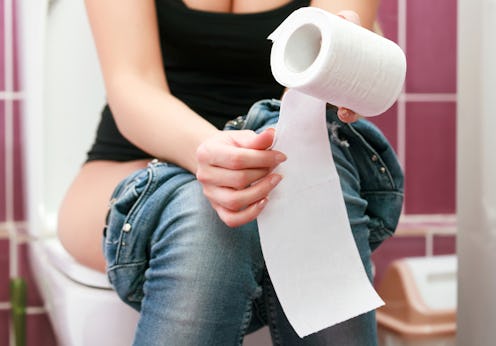Life
8 Things That Happen Inside Your Body When You’re Constipated

Not being able to go to the bathroom is frustrating enough, but unfortunately, constipation comes with more than just an inability to go number two. There are a handful of things that can happen inside your body when you're constipated, and they can range from plain old discomfort to more serious issues such as muscle tears or dehydration. Constipation can affect your whole body, so if you're frequently backed up, you might experience a number of other symptoms that you didn't even realize were connected to your difficulty passing bowel movements.
"Constipation can affect the way other parts of your body function and feel," Dr. Carolyn Newberry, a gastroenterologist and physician nutrition specialist at New York-Presbyterian/Weill Cornell Medical Center tells Bustle. "For example, when the body is unable to move stool easily through the digestive tract, food, gas, and acid can build up in the stomach and small intestines leading to unpleasant bloating, nausea, and heartburn symptoms. Besides problems in the digestive tract itself, stool that is stuck in the colon can compress outside structures such as the bladder."
Everyone experiences constipation in different ways, but it can have a greater impact on how you feel than you might think. Here are eight things that happen inside your body when you're constipated, according to experts.
1Muscle Tears
As if constipation wasn't uncomfortable on its own, it can also lead to muscle tears if you find yourself straining on the toilet. "Increased pressures associated with hard-to-pass stools can cause tearing in the external sphincter muscle that regulates bowel movements," Dr. Newberry says. "This over time may lead to inflammation, bleeding, and pain."
2Change In Appetite
Your appetite can also be affected by your inability to go to the bathroom, and many people tend to get full very easily when they are chronically constipated. "Increased stool in the colon causes blockages higher up in the GI tract, which can lead to decreased appetite and inability to eat," Dr. Newberry says.
3Dehydration
Constipation and dehydration often go hand in hand, and this can lead to issues such as headaches, dizziness, and even sweating episodes. "These symptoms have many causes including dehydration, abnormal mineral levels (such as magnesium or calcium), or increased stimulation of the nervous system while trying to pass hard stools, which may even lead to fainting," Dr. Newberry says.
4Hemorrhoids
One of the major side effects of being constipated is your increased risk of developing hemorrhoids. "Normally blood vessels around the anus are small and go unnoticed," Dr. Newberry says. "However with repeated straining episodes, these vessels can dilate and cause pain, itchiness, and bleeding that may worsen every time you pass a stool."
5Leakage
Because the bladder and the colon are close together in the body, there is a close relationship between the muscles and nerves that control bladder functions and those that control bowel movements, according to the Department of Urology at the University of California, San Francisco. Since large amounts of stool in the colon can put pressure on the bladder, constipation can lead to leakage such as daytime or nighttime wetting or even urinary tract infections.
6Bloating & Gas
"One of the most common complaints of patients who suffer from constipation is bloating and increased flatulence," GI specialist Mike Bass, MD tells Bustle. "When stool stays in the colon for longer than normal periods of time, this allows the bacteria in the gut microbiome to act upon the stool and form gas. That is why normalizing bowel movements can help with flatulence."
7Nausea
Not only can constipation lead to stomach pain, but it can also cause nausea for many people, and in some cases, even vomiting, according to Harvard Health. "Choosing liquid meals, like warm smooth soups until the issue is resolved, can sometimes help," Julie Stefanski, registered dietitian and spokesperson for the Academy of Nutrition & Dietetics, tells Bustle.
8Loose Stools
When you think of constipation, you definitely don't think of loose stools. But in addition to hard stools, constipation can also lead to loose stools. "It’s not uncommon to see watery-like stools when constipation is severe, as loose bowel movements 'sneak around' the harder stools stuck in your colon," Dr. Newberry says.
If you have chronic constipation, see a GI specialist, who can help alleviate your symptoms.